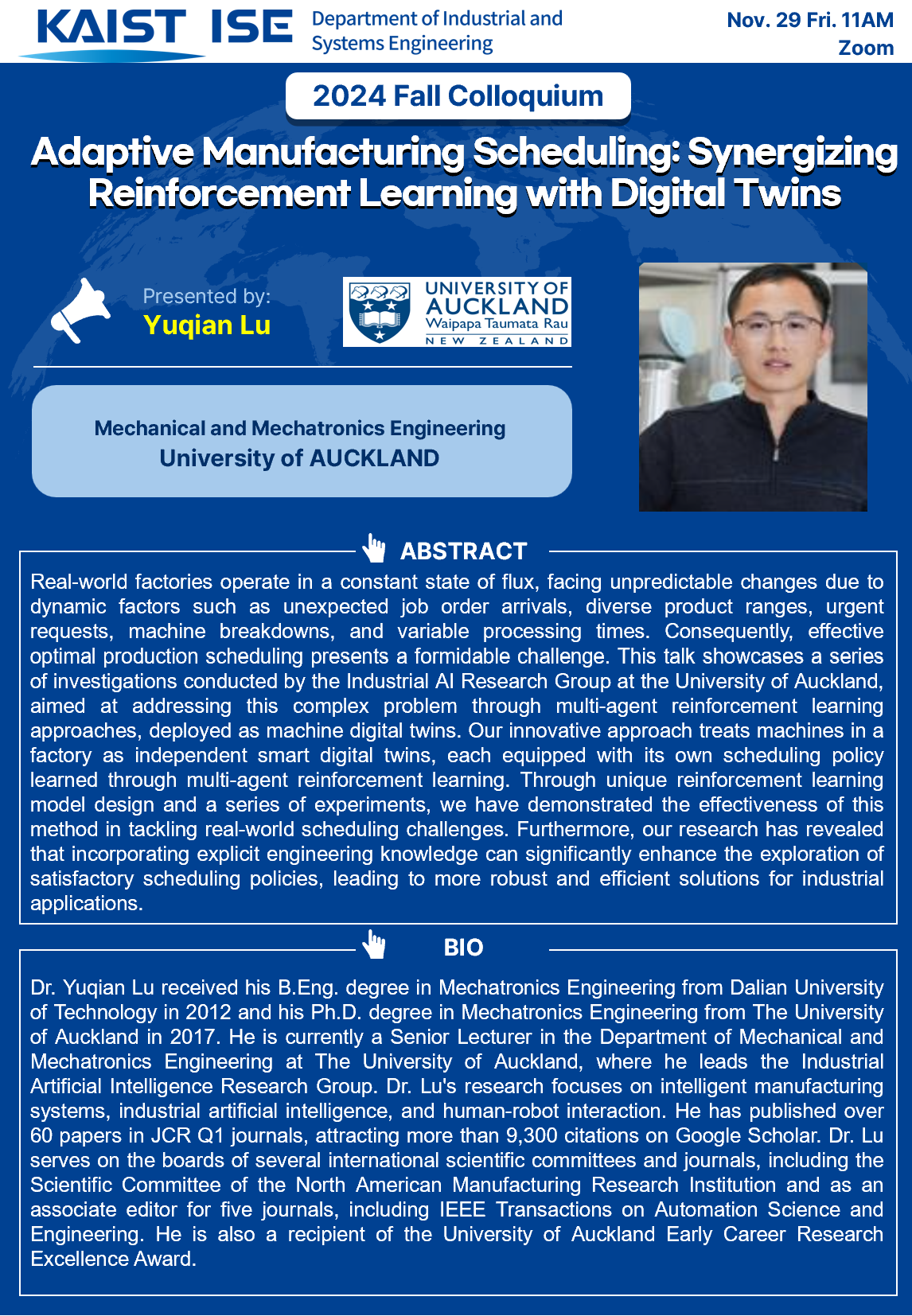뉴스 및 공지사항
- 관리자
- 2024.11.25
- 738
Real-world factories operate in a constant state of flux, facing unpredictable changes due to dynamic factors such as unexpected job order arrivals, diverse product ranges, urgent requests, machine breakdowns, and variable processing times. Consequently, effective optimal production scheduling presents a formidable challenge. This talk showcases a series of investigations conducted by the Industrial AI Research Group at the University of Auckland, aimed at addressing this complex problem through multi-agent reinforcement learning approaches, deployed as machine digital twins. Our innovative approach treats machines in a factory as independent smart digital twins, each equipped with its own scheduling policy learned through multi-agent reinforcement learning. Through unique reinforcement learning model design and a series of experiments, we have demonstrated the effectiveness of this method in tackling real-world scheduling challenges. Furthermore, our research has revealed that incorporating explicit engineering knowledge can significantly enhance the exploration of satisfactory scheduling policies, leading to more robust and efficient solutions for industrial applications.
#Bio
Dr. Yuqian Lu received his B.Eng. degree in Mechatronics Engineering from Dalian University of Technology in 2012 and his Ph.D. degree in Mechatronics Engineering from The University of Auckland in 2017. He is currently a Senior Lecturer in the Department of Mechanical and Mechatronics Engineering at The University of Auckland, where he leads the Industrial Artificial Intelligence Research Group. Dr. Lu's research focuses on intelligent manufacturing systems, industrial artificial intelligence, and human-robot interaction. He has published over 60 papers in JCR Q1 journals, attracting more than 9,300 citations on Google Scholar. Dr. Lu serves on the boards of several international scientific committees and journals, including the Scientific Committee of the North American Manufacturing Research Institution and as an associate editor for five journals, including IEEE Transactions on Automation Science and Engineering. He is also a recipient of the University of Auckland Early Career Research Excellence Award.
---------------------------------------------------------------------------------------------------------------------------------------------------------------------------------------
# Location: Zooom
# Presenter: Yuqian Lu
Real-world factories operate in a constant state of flux, facing unpredictable changes due to dynamic factors such as unexpected job order arrivals, diverse product ranges, urgent requests, machine breakdowns, and variable processing times. Consequently, effective optimal production scheduling presents a formidable challenge. This talk showcases a series of investigations conducted by the Industrial AI Research Group at the University of Auckland, aimed at addressing this complex problem through multi-agent reinforcement learning approaches, deployed as machine digital twins. Our innovative approach treats machines in a factory as independent smart digital twins, each equipped with its own scheduling policy learned through multi-agent reinforcement learning. Through unique reinforcement learning model design and a series of experiments, we have demonstrated the effectiveness of this method in tackling real-world scheduling challenges. Furthermore, our research has revealed that incorporating explicit engineering knowledge can significantly enhance the exploration of satisfactory scheduling policies, leading to more robust and efficient solutions for industrial applications.
#Bio
Real-world factories operate in a constant state of flux, facing unpredictable changes due to dynamic factors such as unexpected job order arrivals, diverse product ranges, urgent requests, machine breakdowns, and variable processing times. Consequently, effective optimal production scheduling presents a formidable challenge. This talk showcases a series of investigations conducted by the Industrial AI Research Group at the University of Auckland, aimed at addressing this complex problem through multi-agent reinforcement learning approaches, deployed as machine digital twins. Our innovative approach treats machines in a factory as independent smart digital twins, each equipped with its own scheduling policy learned through multi-agent reinforcement learning. Through unique reinforcement learning model design and a series of experiments, we have demonstrated the effectiveness of this method in tackling real-world scheduling challenges. Furthermore, our research has revealed that incorporating explicit engineering knowledge can significantly enhance the exploration of satisfactory scheduling policies, leading to more robust and efficient solutions for industrial applications.


